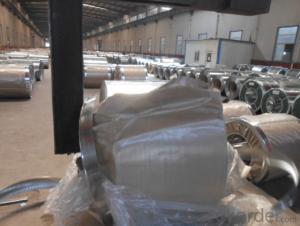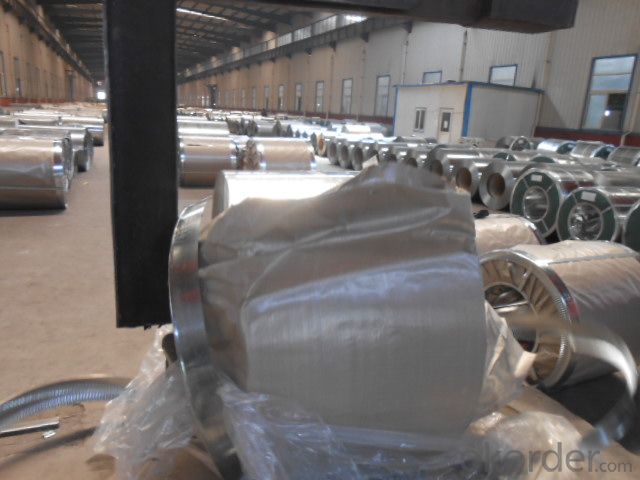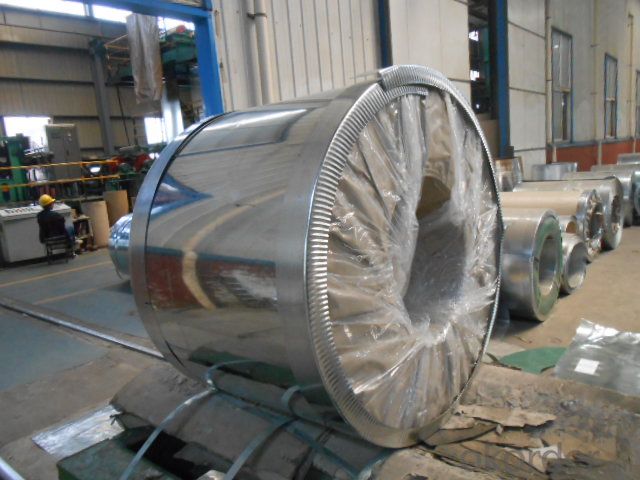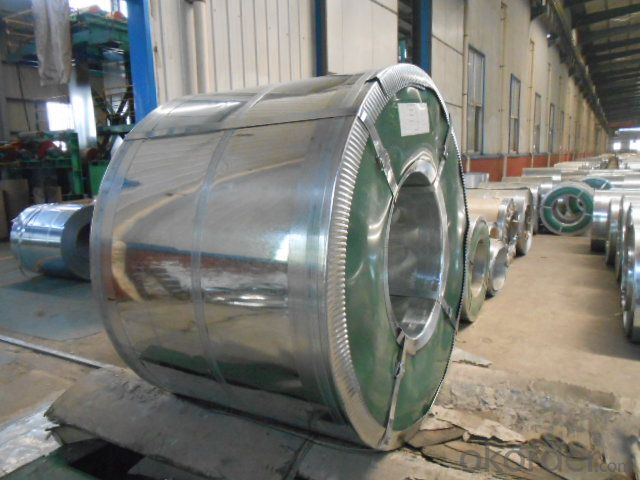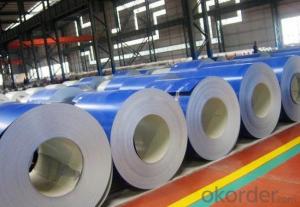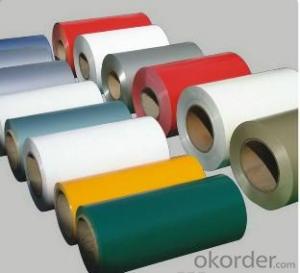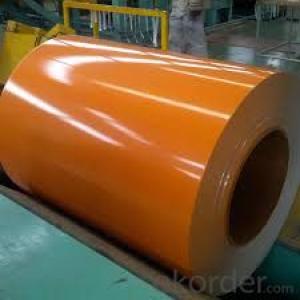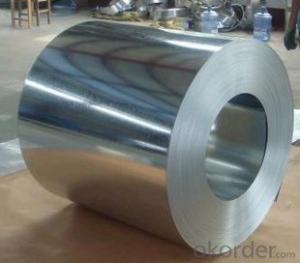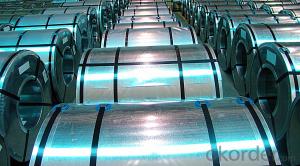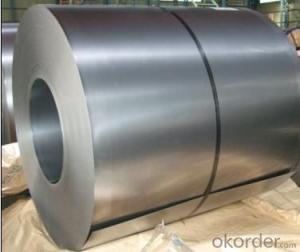HOT DIPPED GALVANIZED STEEL COIL BEST
- Loading Port:
- China Main Port
- Payment Terms:
- TT OR LC
- Min Order Qty:
- -
- Supply Capability:
- 10000 m.t./month
OKorder Service Pledge
OKorder Financial Service
You Might Also Like
HOT-DIP GALVANIZED STEEL COIL
SIZE:0.2mm*762mm*C
ZINC COATING:60g/m2
STANDARD:JIS G 3302
SURFACE:CHROMATED,REGULAR SPANGLE, UNOILED
STEEL GRADE:SGCH HARD QUALITY(75-95 HRB)
COIL WEIGHT:3-6 ton
COIL ID:508mm
TOLERANCE: THICKNESS:-0.02mm; WIDTH:0/5mm.ZINC COATING:60g/m2 TOLERANCE:+/-10% WITH QUANTITIES AND AMOUNT.
PACKAGE:FULL PACKED WITH ANTI-DAMP PAPER,IRON SHEET OUTSIDE;
PRODUCTION TIME:30DAYS AFTER RECIEVE DOWN PAYMENT OR CORRECT LC.
PAYMENT TERM:20%TT,80% AGAINST BL COPY./100% IRREVOCABLE LC AT SIGHT.
- Q: What is the maximum width of a steel coil?
- The maximum width of a steel coil can vary depending on the manufacturing process and the specific requirements of the industry. However, in general, steel coils can have a maximum width of around 2,200 millimeters (86.6 inches).
- Q: How are steel coils used in the production of agricultural systems?
- Due to their durability and strength, steel coils are frequently employed in the production of agricultural systems. Specifically, these coils are commonly utilized in the creation of machinery and equipment essential for agricultural operations. One prevalent use of steel coils lies in the manufacture of farming machinery such as tractors, plows, and cultivators. These machines necessitate robust components capable of enduring the challenging conditions present in the agricultural environment. Steel coils are employed to fabricate the frames, chassis, and other structural parts of these machines, providing the necessary strength and support. Additionally, steel coils are employed in the creation of irrigation systems, which play a crucial role in efficient water management within agriculture. These coils are employed in the construction of pipes, valves, and fittings, ensuring the durability and long-lasting nature of the irrigation system. Furthermore, steel coils are employed to fabricate storage tanks and silos, which serve as vital tools for storing and preserving agricultural products like grains, seeds, and fertilizers. Moreover, steel coils find application in the construction of greenhouses and agricultural buildings. These coils are used to fabricate the structural framework, providing stability and resistance against environmental factors. Steel coils are also employed in the production of fencing and enclosures to safeguard crops and livestock from external threats. In conclusion, steel coils play a significant role in the production of agricultural systems by delivering the necessary strength, durability, and stability required for farming machinery, irrigation systems, storage facilities, and agricultural structures. Their utilization ensures that these systems can withstand the demanding conditions of the agricultural industry and contribute to efficient and sustainable farming practices.
- Q: I got my dog those nice looking stainless steel water and food bowls (looks great next to my kitchen appliances...haha). The thing is my dog will drink from the toilet or a plastic bowl but not out of his bowl...I was wondering if those stainless steel bowls change the taste of food and water?
- It is possible. Stainless steel is usually mixed with a few other metal compounds to create certain properties for it, like iron for durability, and nickel and silver for luster(so they look good in your house!). It is very possible that your dog is tasting some of those metals in his water, and since his senses are a lot keener tan ours, it may bother him. My dogs drink out of a stainless steel bowl, and they do fine, so it may be your dog's own personal preference to drink out of someting non-metal. Just give in to him and give him a nice-looking plastic or ceramic bowl. (Hint: Ceramic keeps his water cold longer!)
- Q: Hi my dad bought a stain steel refridg. yesterday, and we went to clean it and it looks all streaky and gets finger prints and stuff on it too easily we used mr clean multisurface cleaner and it didnt work to well is there a certain type of cleaner we are supposed to use?
- buy stainless steel wipes at the grocery store. they work great.
- Q: How do steel coils contribute to the automotive manufacturing sector?
- Steel coils are essential in the automotive manufacturing sector as they are used to produce various components such as body parts, frames, and suspension systems. The high strength and durability of steel coils make them ideal for ensuring the safety and structural integrity of vehicles. Additionally, steel coils are easily moldable, allowing manufacturers to create complex shapes and designs, contributing to the overall aesthetics and functionality of automobiles.
- Q: Or is it a coating that is applied? If so what types of steel? Or what types of coatings?
- No, usually they are just coated or galvanized. To make a steel that is truly more corrosion resistant raises it's cost quite markedly, where as coatings are pretty cheap. Almost all structural steel is just A36 mild steel (like 0.1% carbon, 0.05% Mn, and not much else). There are higher grades of structural steel, and bridges are made with truly more corrosion resistant carbon steels, but for a house it's just not the case.
- Q: What are the dimensions of steel coils used in the pipeline industry?
- The dimensions of steel coils used in the pipeline industry can vary depending on the specific application and requirements. However, common dimensions for steel coils used in the pipeline industry typically range from 0.5 to 3.0 inches in thickness and 24 to 60 inches in width. The length of the coils can vary as well, with standard lengths often ranging from 100 to 200 feet. These dimensions are designed to meet the necessary strength and durability requirements for pipeline construction and transportation of various fluids and gases. It is important to note that these dimensions can vary depending on the specific project and industry standards.
- Q: I work at a tool store. I told my boss last week we needed more pruning shears so he did get more of all kinds. Thing is out of all of the shears he brought Two of different kinds say they are made out of Japanese steel. I have never heard of Japanese steel so now i ask you (the public) whats the difference between it and steel from the US or any other country? Those shears are worth more then the ones he gets from Mexico and China and even more than Black and Decker, Fiskars, etc but not more then Corona brand ones.
- Well Japan, with democracy and code standards, would be better than China or Mexico, with poorly paid workers and poor standards and poor quality. I don't know why or if its better quality than US steel
- Q: I wrote in my assignment that mild steel has a high carbon content (4%).This is why it has its strong and rigid properties.. is this correct?
- Steel is defined as an alloy of iron and carbon (often supplemented by further materials) with a carbon content between 0.01 % and 2.06 %. 4% is in the realm of cast iron, which isn't quite as rigid as steel. Mild steel contains 0.16 - 0.29% carbon. You're off by more then a decimal.
- Q: How are steel coils used in the production of fireproof doors?
- Steel coils are used in the production of fireproof doors as they are the primary material for constructing the door's core. The steel coils are shaped and layered to create a strong and heat-resistant core, which provides the necessary structural integrity and fire resistance required for fireproof doors.
Send your message to us
HOT DIPPED GALVANIZED STEEL COIL BEST
- Loading Port:
- China Main Port
- Payment Terms:
- TT OR LC
- Min Order Qty:
- -
- Supply Capability:
- 10000 m.t./month
OKorder Service Pledge
OKorder Financial Service
Similar products
Hot products
Hot Searches
Related keywords
